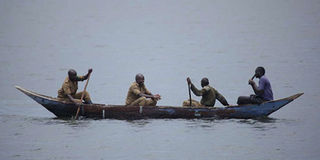Language is an activity of the mouth

National Youth Service officers clean-up Kendu Bay, on the shore of Lake Victoria in Migori County, on October 1, 2019. Each of the great number of ethno-linguistic communities who live or have lived in or around Lake Victoria has had its own word for the celebrated water system. PHOTO | FILE | NATION MEDIA GROUP
What you need to know:
- The Luo are merely the Nilotic people of Kenya, the Sudan, Tanzania and Uganda who have contributed most significantly to that culturo-linguistic linkage.
Polo is the word that East Africa’s inter-lacustrine Nilotes called Luo, among whom I was born, use for the ordinary sky and the imaginary place above it that religious priests promise as heaven.
For the religious Luo, then, polo exists far above human beings, at a celestial place which a fiercely male deity, whom religion names as the Creator, has chosen as his headquarters.
The Luo, then, are a large inter-lacustrine Nilotic Eastern African community. Along with certain other related ethnic peoples, the Luo are called Nilotes, because of their historic existential association with the great watery stretch known to the whole world as the Nile, a river.
For that historic river system is linked to the lake that the English colonialists gave the name Victoria, after their own female monarch of the time — a name which Kenya is nationally called upon to change appropriately.
It is that river which, after an extraordinarily long journey, pours into the Mediterranean Sea.
SPEECH
If the Luo have a name for that lake, I do not know it. For Lolwe, the word that many Luos claim as its name, appears to be merely adjectival. It seems to refer simply to its extraordinary geographic expanse.
Yet, indeed, the word Dholuo — the Luo name for our mother tongue — literally translates as “mouth of the Luo”.
And, I ask, what else, but mouths, do human beings use for speech? The root dho is merely the possessive form of the Luo word dhok, any mouth or any mouth-like structure.
The word dhonam, for instance, refers to the edge or “mouth” of a lake or an ocean.
In the word Dholuo, the element dho is an abbreviation of the word dhok (mouth). Dho, which is what extends to dhok, is the Luo word both for a mouth and for a language.
So, the Luo word Lolwe is not limited to Lake Victoria. Lolwe appears to refer to any geographic structure that extends farther away than the ordinary human eye can see.
LAKE VICTORIA
The most probable explanation of the first three letters of, for example, the words Dholuo, Dhoingresa (English), Dho-Okuyu (the Kikuyu language) and Dho-Lang’o (any of the languages of the Maasai and the Kalenjin) is that, in essence, language is an activity of dhok, the mouth.
To reiterate, then, dhok is the Luo word both for a mouth and for a language.
Each of the great number of ethno-linguistic communities who live or have lived in or around Lake Victoria has had its own word for the celebrated water system that geo-humanly links Kenya with Uganda and Tanzania.
The Luo are merely the Nilotic people of Kenya, the Sudan, Tanzania and Uganda who have contributed most significantly to that culturo-linguistic linkage.
NOTHING SPECIAL
Nevertheless, I claim nothing special whenever I proclaim my own “Luo-ness”. I am a Luo merely because it was among the Luo that I was born and spent my first 10 years.
It was among the Luo that I first learnt to speak a language and otherwise to behave like a human being.
Nevertheless, I can assert that I have enjoyed nothing special above what my age-mates have enjoyed among such important neighbouring ethnic communities as the Gusii, Kalenjin, Luhya, Maasai and Tende.
Mr Ochieng is a veteran journalist.





